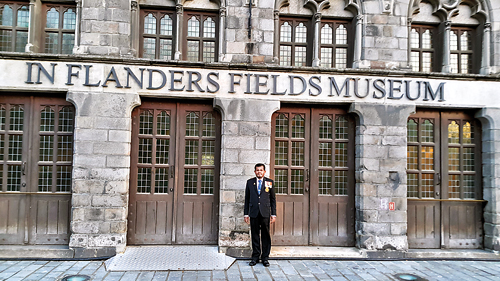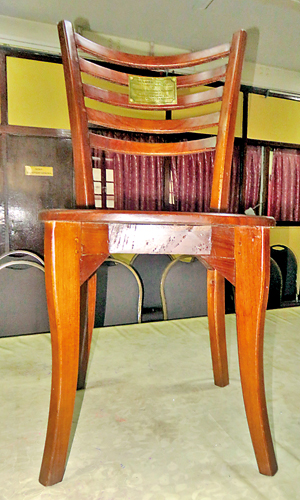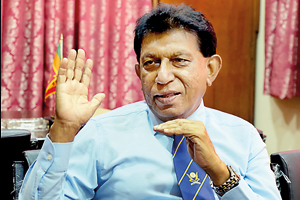A labour of love and an empty chair from Lanka at In Flanders Fields Museum

Mr. Ariyarathne at the Museum, and right, Brigadier Gunaweera
Making the same journey made by those who sacrificed their lives in World War 1 from 1914-1918, 120 empty chairs representing the nations that fought in the war arrived at the ‘In Flanders Fields Museum’ in Ypres, Belgium a few weeks ago. The artistic expression of remembrance of the fallen heroes from all parts of the world, was part of the Centennial Commemorations of the First World War by the In Flanders Fields Museum dedicated to the memory of the First World War. The Sri Lankan representation was made by MCPOE (Rtd) S.A. Ariyarathne.
Located in the renovated Cloth Halls of Ypres, the In Flanders Fields Museum presents the story of the First World War in the West Flanders front region and is seen as an important symbol of wartime hardship and later recovery.

The empty chair that travelled from Sri Lanka
The empty chairs, as Brigadier K.A. Gnanaweera, President, Sri Lanka Ex-Servicemen’s Association (SLESA) explains, symbolised the loss from each country. “Like the empty chairs which now remain in Belgium, those who left the shores of their respective countries never returned and the idea of international collaboration was to remember them all collectively.”
 The voluntary contribution by Mr. Ariyarathne, which included the travel to Belgium and the cost of the chair was a labour of love. “When SLESA tabled the invitation extended by the In Flanders Fields Museum, I volunteered to represent the country,” says the former naval officer.
The voluntary contribution by Mr. Ariyarathne, which included the travel to Belgium and the cost of the chair was a labour of love. “When SLESA tabled the invitation extended by the In Flanders Fields Museum, I volunteered to represent the country,” says the former naval officer.
The chair made of teak made its journey to the In Flanders Fields Museum in a specially delivered carton of 95×52 cm. “The design of the chair was our call and it had to be fitted into the special box which was dispatched to all participating nations,” recollects Mr. Ariyarathne. The chairs, he tells us, will be part of a permanent collection at the Brussels National Museum after a public display at In Flanders Fields Museum.
As part of the commemoration programme, the chairs were placed in Astrid Park in the centre of Ypres behind St. Martin’s Cathedral and were lit by a candle in a lantern in recognition of the country and distance they had travelled.


